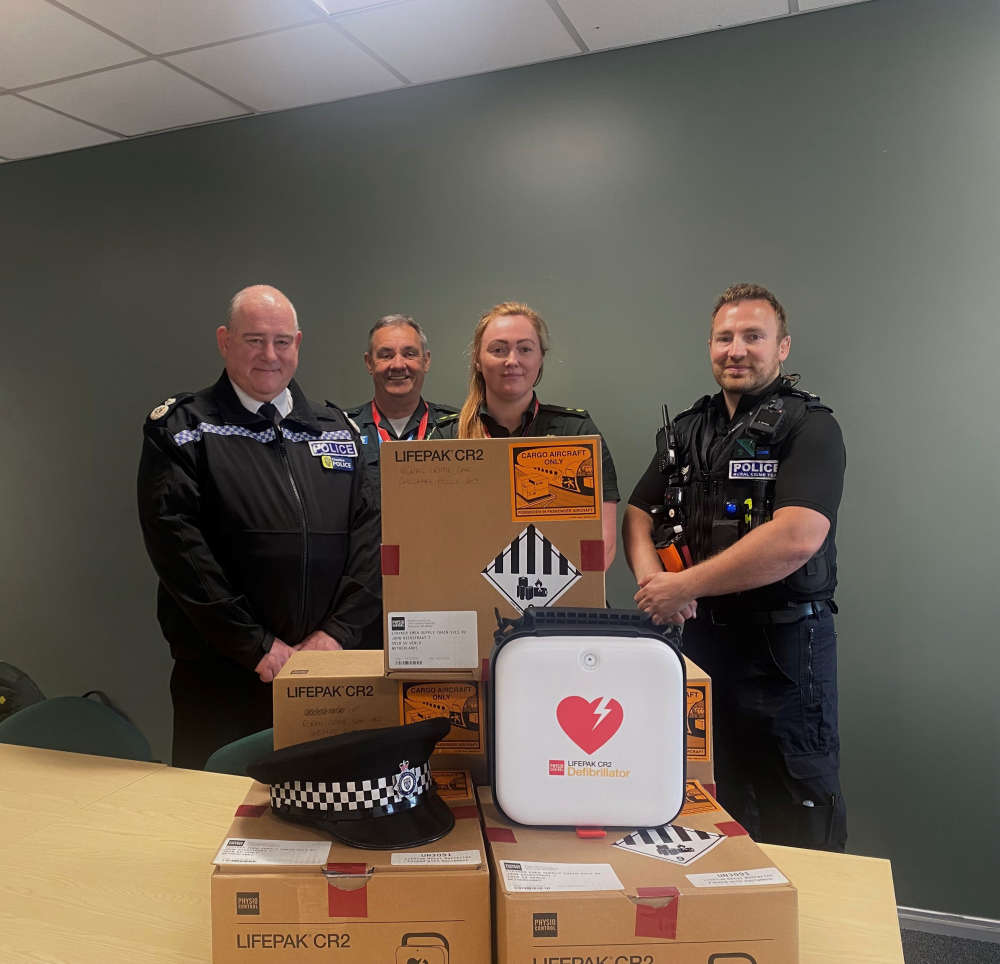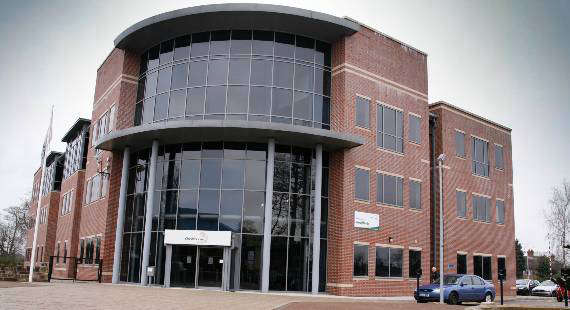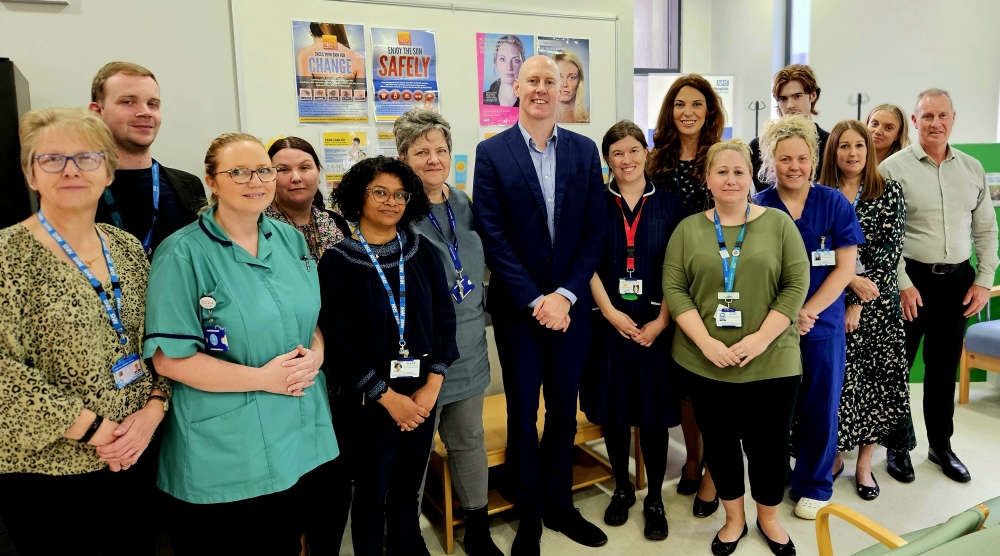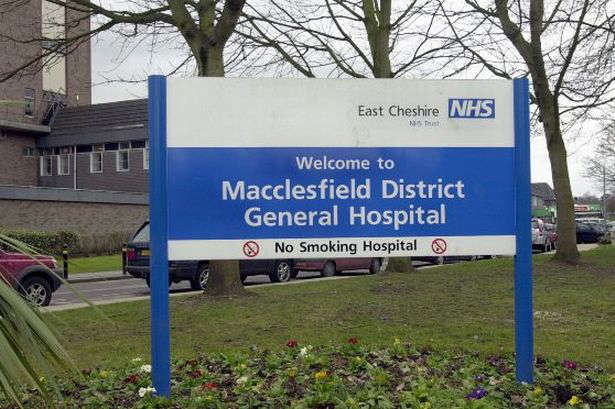
People with persistent tummy troubles in the North West, including diarrhoea, bloating or discomfort in the tummy area, are being urged to get checked for cancer as part of the NHS and Public Health England’s ‘Help Us, Help You’ campaign.
TV adverts and social media posts in the North West will urge people to speak to their GP if they have a symptom including diarrhoea, bloating or discomfort in the tummy area for three weeks or more as they could be a sign of cancer.
Figures show that 11,694[i] people are diagnosed with cancers in the abdominal area in the North West every year, which includes ovarian, kidney and bowel cancers.
More than four in ten people would leave it longer to get health advice than they normally would have before the coronavirus outbreak,[ii] however delaying can have serious consequences for some cancers.
While there was a dip in referrals for these cancers at the peak of the first COVID wave, more people are now coming forward for checks.[iii]
Hospitals have put extensive measures in place so that patients can get safely tested and treated, including by rolling out COVID protected hubs across the country and introducing treatment swaps that require fewer trips to hospital and have less of an effect on cancer patients’ immune systems.
England’s Top GP has said people should not hesitate to get in touch with their GP if they have concerns and reassured the public that local health services have plans in place so people can continue to get tests and treatment.
Dr Nikki Kanani, GP and medical director for primary care for NHS England, said:
“If you or a loved one has one of these symptoms, please don’t ignore them. Our message to you is clear – you are not a burden and we are here to safely treat you so please don’t delay – help us help you and come forward as you usually would for care.
“Cancer is easier to treat when it is caught at an earlier stage and so coming forward for a check could save your life.”
Professor Daniel Palmer, Consultant Medical Oncologist at The Clatterbridge Cancer Centre NHS Foundation Trust and Centre Lead for the Liverpool Experimental Cancer Centre (ECMC), said:
"Early diagnosis often leads to better treatment options and can save lives, so it’s important to detect signs as early as possible. If you or a member of your family have any cancer-related concerns then speak to your local GP; they’re here to support you. GPs are taking the utmost care to ensure practices are a safe and COVID-secure environment. We know that there are symptoms of abdominal cancer which people tend to ignore or feel embarrassed about. This campaign is about changing behaviour by alerting North West residents to the potential signs and encouraging them to go to their GP.”
Dr Philippa Kaye, media medic, GP and diagnosed with bowel cancer:
“As both a GP and someone who has had bowel cancer myself, I have seen the situation from both sides and can honestly say, if you’re experiencing any tummy troubles for a few weeks, your GP will want to know about it. Hopefully it’s nothing serious but if it is cancer there are lots of treatment options available and the earlier cancer is found, the better. I know that some of my patients are nervous to come to my clinic because of coronavirus, but the NHS has put measures in place to ensure we can see you safely. So please, come and see us.”
Dr Yvonne Doyle, Medical Director of Public Health England said:
“Far too many of us ignore what our body is trying to tell us. We say to ourselves it’s nothing really, we don’t want to make a fuss. But if you’re getting persistent stomach problems it may be a sign of cancer, possibly bowel, kidney or ovarian cancer. It’s so important you find out for sure as early as possible. Don’t wait until it’s too late. Be positive, take control of your health, get in touch with your GP. Our NHS has adapted its services and can see you safely.”
The new drive is part of NHS England & Improvement, and Public Health England’s the ‘Help Us, Help You’ campaign which looks to address the barriers that are deterring patients from accessing NHS services. The campaign reminds people that the NHS has adapted its services and can still see patients safely.”
Visit nhs.uk/cancersymptoms for more information.
- The NHS has introduced a range of measures, including COVID-secure wards and COVID protected cancer surgical hubs to ensure the safety of patients
- From the start of the pandemic to the end of August, more than 870,000 people were urgently referred and over 90% of them were subsequently seen by a specialist within two weeks. Cancer treatment levels were maintained at 85% of 2019 levels during the height of the pandemic– showing that the NHS is there for people when they need it.[iii]
- On Friday 9th of October, NHS England and NHS Improvement launched the initial Access phase of the ‘Help Us, Help You’ campaign to encourage the public to contact their GP if they are worried about a symptom that could be cancer (such as unexplained blood, a lump, weight loss which feels significant or an unexplained pain that lasts three weeks or more) and encourage pregnant women to keep appointments and seek advice from their midwife or maternity team if they are worried about their baby.
- A number of lesser known abdominal cancers include sarcoma, neuroendocrine, cholangiocarcinoma, and mesothelioma.
- Jane Lyons, CEO of Cancer52, a charity which has nearly 100 charity members working in rare and less common cancers; ie outside the four most common cancers of breast, bowel, lung and prostate, said: “We are very pleased to see this campaign launching for two main reasons. Firstly it reinforces the message that even at this time the NHS wants and needs people to go to their GP if they have symptoms that could be cancer so that they can be helped earlier; and secondly because at least half of the estimated 84,000 diagnoses for cancers with abdominal symptoms are for cancers that are rare or less common and therefore not as well known amongst the public. These cancers include oesophageal, stomach, pancreatic, ovarian, kidney and womb as well as even lesser known cancers like sarcoma, neuroendocrine, cholangiocarcinoma, and mesothelioma. All of them need more attention and this campaign on the importance of abdominal symptoms is a great place to start.”
- Assets for the campaign can be found via the following Dropbox link.
KEY FACTS AND STATISTICS
CANCER DIAGNOSES
- In England, around 84,000 people were diagnosed with abdominal cancers (Oesophageal, Stomach, Pancreatic, Ovarian, Colorectal (Bowel), Kidney and Uterine) in 2018[i]
- Abdominal cancers account for 26% of all cancer diagnoses in England and 30% of all cancer deaths[iv]
- The number of abdominal cancers diagnosed each year have increased in England over the past 10 years[i]
Numbers of abdominal cancers by region 2018 (table 1) [i]
|
East |
9641 |
|
East Midlands |
7606 |
|
London |
8975 |
|
North East |
4508 |
|
North West |
11694 |
|
South East |
14181 |
|
South West |
9652 |
|
West Midlands |
9059 |
|
Yorkshire and the Humber |
8645 |
Numbers of abdominal cancers by age 2018 (table 2) [i]
|
Under 1 |
11 |
|
1 to 4 |
65 |
|
5 to 9 |
15 |
|
10 to 14 |
27 |
|
15 to 19 |
45 |
|
20 to 24 |
118 |
|
25 to 29 |
248 |
|
30 to 34 |
517 |
|
35 to 39 |
1000 |
|
40 to 44 |
1343 |
|
45 to 49 |
2493 |
|
50 to 54 |
4586 |
|
55 to 59 |
6856 |
|
60 to 64 |
8748 |
|
65 to 69 |
10759 |
|
70 to 74 |
13577 |
|
75 to 79 |
11919 |
|
80 to 84 |
10930 |
|
85 to 89 |
7190 |
|
90 and over |
3514 |


 Three men sentenced for drug dealing in Macclesfield
Three men sentenced for drug dealing in Macclesfield
 Tree planted to honour devoted foster carers during Foster Care Fortnight
Tree planted to honour devoted foster carers during Foster Care Fortnight
 Appeal for information following serious sexual assault in Knutsford
Appeal for information following serious sexual assault in Knutsford
 Rural Crime Team equipped with mobile defibrillators
Rural Crime Team equipped with mobile defibrillators
 Enterprising Future For Macclesfield
Enterprising Future For Macclesfield
 Is being a wholetime firefighter the job for you?
Is being a wholetime firefighter the job for you?
 Community café and support centre has secured support from Knutsford Town Council
Community café and support centre has secured support from Knutsford Town Council
 £1k boost to Knutsford In Bloom
£1k boost to Knutsford In Bloom
 Council and football club strike deal to deliver major revamp of local sports facility
Council and football club strike deal to deliver major revamp of local sports facility
 Cheshire Constabulary to support national operation to cut out county-wide knife crime
Cheshire Constabulary to support national operation to cut out county-wide knife crime
 It's up to everyone to help keep public toilets open
It's up to everyone to help keep public toilets open
 Local swim school takes lifesaving efforts onto dry land
Local swim school takes lifesaving efforts onto dry land
 Deal to deliver major revamp of local sports facility
Deal to deliver major revamp of local sports facility
 Work gets underway on Congleton War Memorial Hospital’s ‘Wellbeing Garden’
Work gets underway on Congleton War Memorial Hospital’s ‘Wellbeing Garden’
 Old School Disco night in aid of Macclesfield Hospital’s breast screening unit
Old School Disco night in aid of Macclesfield Hospital’s breast screening unit
 Rugby player Doddie Weir’s MND campaign celebrated at RHS Flower Show Tatton Park
Rugby player Doddie Weir’s MND campaign celebrated at RHS Flower Show Tatton Park
 Mid Cheshire Hospitals Dermatology team takes aim at myths and promotes skin health
Mid Cheshire Hospitals Dermatology team takes aim at myths and promotes skin health
 Maternity services at Macclesfield District General Hospital rated as good
Maternity services at Macclesfield District General Hospital rated as good
 Officers continue to urge Cheshire residents to remain vigilant against courier fraud
Officers continue to urge Cheshire residents to remain vigilant against courier fraud


